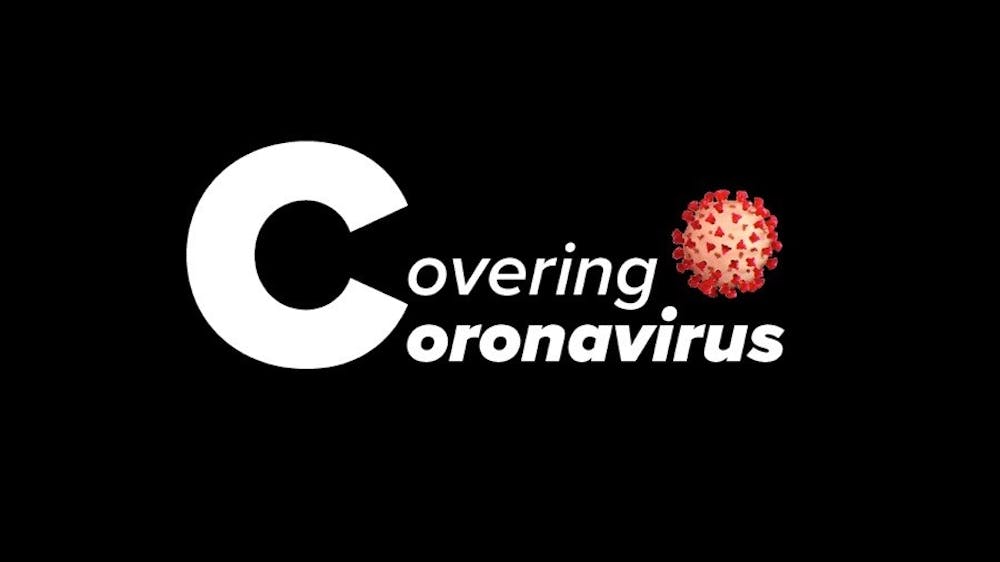Editor’s note: This article originally appeared on theeaglecoronavirusproject.com, a separate website created by Eagle staff at the onset of the coronavirus pandemic in spring 2020. Articles from that website have been migrated to The Eagle’s main site and backdated with the dates they were originally published in order to allow readers to access them more easily.
Six months ago, on March 12, American University students received an email from President Sylvia Burwell that changed their college experiences more than any other event in recent history: AU was going fully online for the remainder of the spring semester, not just for three weeks, as the administration originally announced.
While the news that AU was transitioning to virtual education didn’t signal the first coronavirus-related change to the semester — just a day earlier, all study abroad programs were canceled — it was the moment that many students realized things weren’t going back to normal anytime soon.
“Within the last 24 hours, the World Health Organization (WHO) declared COVID-19 a pandemic,” Burwell wrote at the time. “There are now more than 124,000 cases in 118 countries, and the WHO expects the number of cases and affected countries to grow. Mayor Muriel Bowser declared a state of emergency for the District, and the DC Department of Health recommended that non-essential mass gatherings, including conferences and conventions, be postponed or canceled.”
Earlier that day, the Patriot League canceled all spring practices and competitions, prematurely ending a major sports season. At the time, much of the student body was spread around the world on spring break. In January, students studying abroad in China were called back home.
Since Burwell’s March 12 email, the AU community has been affected in countless ways. A total of 78 students, faculty, staff and contractors were infected between March 1 and Aug. 31, according to AU spokesperson Stacie Burgess. At least one has died: School of Public Affairs and Washington College of Law professor Joseph Kaplan, who was 66.
Students have lost housing, jobs, study-abroad opportunities, affordable transportation, sports, in-person commencement and much more. Faculty, staff and the University itself have also suffered.
Kyla Blazer, a junior in SPA and the School of Communication, said that she doesn’t see the effects of the pandemic going away for a “very long time.”
“There are so many aspects of life it touches, including human life itself,” Blazer said. “You can’t measure the impact of a human life being lost.”
In June, the University announced a hybrid reopening plan for the fall, later retracting it at the end of July, in favor of fully online classes. The change helped AU avoid the risk of outbreaks that have dominated the news at UNC Chapel Hill, Iowa State University and more. According to a New York Times tracker, at least 88,000 cases of COVID-19 have been confirmed at more than 1,600 colleges across the country.
Still, the cancellation of on-campus housing and in-person classes has made life for new and returning students chaotic, disconnected and isolated, many said. Students frequently take to Facebook meme pages to commiserate about their online classes and feelings of loneliness, spending even more time on Zoom or FaceTime, in an attempt to remain connected with friends that, in some cases, they haven’t seen since before spring break.
Blazer said that this summer has been the most emotionally difficult part of her life. Not being able to see close friends, especially as a first-generation student without siblings, took a toll, she said.
“When you’re so busy, but you’re just trapped in your room — or like me, sitting at my dining room table — and just go from meeting to meeting, staring at a screen, it wears on you emotionally,” Blazer said. “The pandemic continued to get worse, classes went online and it all just kind of toppled on top of each other. The disappointment adds up, and you can’t really escape it.”
The summer was also filled with headlines about what many refer to as the other pandemic: racism and police brutality. Protests erupted around the globe after Minneapolis police killed George Floyd in May. Despite the pandemic, AU students gathered at demonstrations to push for change.
Ryan Barto, now a 2020 SPA alumnus, was looking forward to finally being able to bring his mom, who didn’t graduate from high school, to his graduation at the end of the spring semester. While he was disappointed not to have an in-person commencement, Barto feels that there are many other more important things to concentrate on.
“If anything, AU prepared me for situations like this,” Barto said. “When things go wrong, AU, and the student body specifically, prepared me to be able to just go out and deal with it, to adapt, to be there, to show up, to stand out, and to not let anything bring you down.”
Looking back, what Barto remembers most clearly from spring break, and from the news that the semester was completely changing, is grief. But as things became clearer, he realized he had to just live with it.
“For a lot of people at AU, AU is their home,” Barto said. “It’s the place that they feel comfortable, where you can see your friend on the quad and get coffee at the Dav, or go to your study spot in SIS. All of that was stripped away.”
Now, students can visit campus after doing an online COVID-19 evaluation, and both The Bridge and The Davenport coffee shops are open for takeout, still staffed by students.
As for what the next six months will bring? Blazer and Barto aren’t certain, but there are some things they can say for sure.
“Follow the damn rules and wear your mask,” Barto said.





